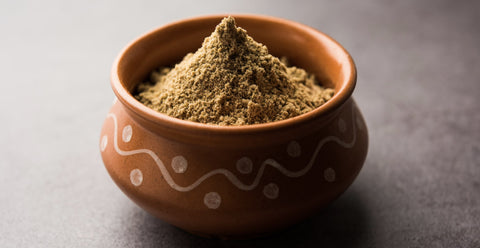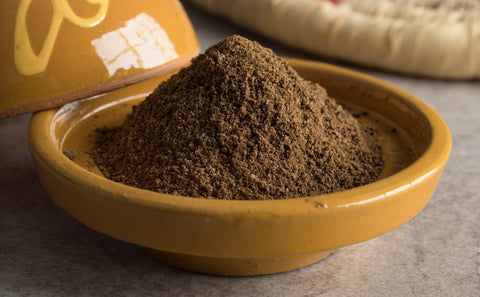If you're looking for a natural beauty solution for hair coloring, henna might just be what you need. Henna is a plant-based dye that has been used for centuries to achieve stunning and vibrant hair color. Not only does it provide a beautiful and natural hue, but it also nourishes and strengthens your hair, leaving it healthy and lustrous.
In this article, we will explore everything you need to know about using henna for hair coloring. From its benefits and application techniques to how it works and the potential side effects, we've got you covered. Whether you're looking to switch to a more eco-friendly hair coloring method or simply want to try something new, henna is definitely worth considering.
Key Takeaways:
- Henna is a natural alternative for hair coloring, providing vibrant and long-lasting color.
- Unlike conventional hair dyes, henna is a healthier choice for your hair and the environment.
- Henna works by binding natural pigments to the hair shaft, resulting in beautiful and rich color.
- It is important to use high-quality henna and follow proper application techniques to avoid any potential side effects.
- Achieving the desired hair color with henna requires consideration of factors such as hair type, texture, and existing color.
Now that you're familiar with the basics, let's dive deeper into the world of henna hair color and discover the wonders it can do for your locks.
What is Henna and How is it Used for Coloring Hair?
Henna, known for its natural beauty and hair coloring properties, has been used for centuries as a safe and effective alternative to chemical hair dyes. Derived from the henna plant, Lawsonia inermis, it offers a range of vibrant colors while nourishing and conditioning the hair.

Henna powder, made from dried and ground henna leaves, is mixed with liquid (such as water or tea) to create a paste. This paste is then applied to the hair, where it stains proteins in the hair shaft, leaving behind a beautiful, long-lasting color.
The Natural Power of Henna
Henna contains a natural dye molecule called lawsone, which has an affinity for binding to keratin proteins in the hair. This property allows henna to penetrate the hair cuticle, creating a permanent color that gradually fades over time. Unlike chemical dyes, henna does not alter the hair structure but enhances its shine and overall health.
Traditionally, henna is applied to the hair in intricate patterns, known as mehndi, for special celebrations and ceremonies. However, henna can also be used to achieve all-over hair color or highlights, providing a customizable and unique look.
When using henna for hair coloring, it is important to select high-quality henna powder to ensure the best results. Additionally, factors such as the starting color of the hair and the length of time the henna paste is left on the hair can influence the final color outcome.
In the next section, we will explore the numerous benefits of using henna for hair coloring and why it has become an increasingly popular choice among individuals seeking a natural and sustainable approach to hair color.
Benefits of Using Henna for Hair Coloring
When it comes to hair coloring, henna offers a natural alternative to conventional dyes. Not only does henna provide vibrant and long-lasting color, but it also brings a host of benefits for both your hair and the environment.
One of the key advantages of henna is that it is a natural alternative to chemical-laden hair dyes. Traditional hair dyes often contain harsh ingredients like ammonia and peroxide, which can damage the hair and strip it of its natural moisture. In contrast, henna is made from the leaves of the Lawsonia inermis plant, a natural coloring agent that is gentle on the hair.
Healthier Hair
Using henna for hair coloring can actually improve the health of your locks. Unlike synthetic dyes, henna coats the hair shaft without penetrating the cuticle, resulting in stronger, thicker, and more resilient strands. Additionally, henna nourishes the hair, promoting overall health and shine.
Long-Term Benefits
Unlike conventional dyes that fade quickly, henna provides long-lasting color that gradually fades over time. This means you can enjoy your desired hair color for longer periods between touch-ups. Additionally, henna can improve the texture of the hair, making it more manageable and less prone to breakage.
Eco-Friendly Choice
Choosing henna for hair coloring is not only beneficial for your hair but also for the environment. Conventional hair dyes often contain harmful chemicals that can pollute water systems and harm aquatic life. Henna, on the other hand, is a natural and biodegradable option that minimizes the ecological impact of hair coloring.
Whether you're looking for a natural alternative to chemical dyes or want to enhance the health of your hair, henna is a fantastic choice. With its numerous benefits, henna offers a sustainable and effective way to achieve beautiful and vibrant hair color.

How Does Henna Work to Color Hair?
Henna has been used for centuries as a natural alternative for hair coloring. Unlike chemical hair dyes, which penetrate and alter the hair shaft, henna works its magic by binding to the outer layer of the hair, creating a vibrant and long-lasting color.
So, how does henna achieve this transformation? It's all thanks to the natural pigments present in the henna plant. When henna powder is mixed with water, a chemical reaction occurs, releasing these pigments known as lawsone. These lawsone molecules are then able to attach themselves to the proteins in the hair, creating a new color.
Unlike chemical dyes that rely on harsh chemicals to lift and replace the natural color of the hair, henna works more gently and does not disrupt the hair's structure. This makes it a safer and healthier option for those looking to enhance their hair's natural beauty.
Another benefit of henna is its conditioning properties. The lawsone molecules not only add color but also bind to the hair strands, creating a protective layer that helps to seal in moisture. This results in hair that looks vibrant, feels soft, and is less prone to breakage.
Furthermore, henna offers a range of color options, from rich reds to deep browns, making it suitable for various hair shades and types. It even covers gray hair effectively, providing a natural-looking result.
When compared to chemical hair dyes, henna is a more sustainable and eco-friendly choice. It is derived from the Lawsonia inermis plant, a renewable resource, and does not release harmful chemicals into the environment.
In conclusion, henna's hair coloring process is rooted in the natural pigments it contains. By binding to the hair shaft, it delivers vibrant color without compromising the hair's health. Its conditioning properties and versatility make it an appealing choice for those seeking a natural and sustainable approach to hair coloring.
Potential Side Effects and Risks of Using Henna for Hair Coloring
While henna is generally considered safe for hair coloring, it is important to be aware of potential side effects and risksbefore using it. By understanding these factors and following proper application techniques, you can minimize any potential issues and enjoy the benefits of henna without concerns.
Possible Side Effects
Some individuals may experience side effects when using henna for hair coloring. These can include:
- Scalp Irritation: Henna may cause mild irritation or itching on the scalp, especially if you have sensitive skin. It is recommended to do a patch test before applying henna to your entire scalp.
- Allergic Reactions: Although rare, some individuals may have an allergic reaction to henna. This can result in symptoms such as redness, swelling, or hives. If you notice any signs of an allergic reaction, discontinue use immediately.
Risks and Precautions
While henna is a natural alternative to chemical hair dyes, it is essential to consider the following risks and take necessary precautions:
- Quality of Henna: Ensure you are using high-quality henna without any additives or chemicals. Poor quality henna may contain harmful substances that can cause adverse reactions.
- Color Variations: The color outcome of henna can vary depending on your existing hair color and texture. It is important to understand that henna may not lighten your hair significantly if you have dark hair.
- Staining: Henna has a strong pigment that can stain fabrics, skin, and bathroom surfaces. Be cautious during the application process and protect your clothes and surroundings.
- Covering Gray Hair: Henna may not provide complete coverage for gray hair, especially if you have a high percentage of gray. It is recommended to consult with a professional colorist if you are looking for full gray coverage.
By being aware of these potential side effects and taking necessary precautions, you can safely enjoy the benefits of henna as a natural and effective hair coloring option. It is always advisable to consult with a dermatologist or hair care professional if you have any concerns or specific conditions.
Tips and Techniques for Achieving Desired Hair Color with Henna
When using henna for hair coloring, it's essential to have a clear understanding of the tips and techniques that can help you achieve the desired color. Here are some expert tips to guide you:
Selecting the Right Henna Shade for Your Hair
The first step in achieving the desired hair color with henna is to choose the right shade that complements your existing hair color. Henna is available in various shades, ranging from deep red to auburn and burgundy. Consider your hair type, texture, and existing color to make an informed decision. Additionally, always opt for high-quality henna to ensure optimal results.
Preparing Your Hair for Henna Application
Before applying henna, it's crucial to prepare your hair to ensure maximum color absorption. Start by washing your hair with a clarifying shampoo to remove any product buildup or impurities. Avoid using conditioner or any other hair products that can create a barrier between the henna and your hair.
Testing the Henna Mixture
Prior to applying henna to your entire head, it is advisable to perform a strand test. This will help you determine the color intensity and ensure there are no adverse reactions. Mix a small amount of henna with water or other natural ingredients (such as lemon juice or tea) according to the package instructions. Apply the mixture to a strand of hair, leave it on for the recommended time, and evaluate the color result before proceeding with the full application.
Applying Henna to Achieve Desired Color Intensity
The duration of henna application plays a crucial role in achieving the desired color intensity. For a more vibrant color, leave the henna mixture on your hair for a longer period. However, it is essential to follow the recommended processing time mentioned in the instructions to avoid damaging your hair or obtaining undesired results.
Enhancing Henna Color with Heat
Applying heat during the henna processing time can enhance the color intensity. After applying henna to your hair, cover it with a shower cap or towel and use a low-heat hairdryer to generate warmth. This allows the henna pigments to penetrate the hair cuticle more efficiently, resulting in a richer color payoff.
Post-Henna Care for Long-Lasting Results
To ensure long-lasting results, it's important to take care of your hair after the henna application. Avoid frequent washing and the use of harsh shampoos that can strip away the color. Opt for sulfate-free, color-safe shampoos and conditioners to maintain vibrancy. Additionally, protect your hair from excessive sun exposure and heat styling, as these can fade the color over time.
By following these tips and techniques, you can confidently achieve your desired hair color with henna. Remember to consider your hair type, texture, and existing color to select the appropriate shade and consult the instructions provided by the henna manufacturer for best results.
Types of Henna for Hair Coloring and Mixing Options
When it comes to henna for hair coloring, there are several types to choose from, each offering unique qualities and color options. One popular type is Rajasthani henna, known for its dark red color and excellent coverage on gray hair. Another option is Yemeni henna, which produces a deeper, burgundy shade. Moroccan henna, on the other hand, gives a vibrant red color that tends to be more orange-toned.
To enhance the conditioning properties of henna and create different color variations, many people like to mix it with other natural ingredients. Adding indigo powder to henna can create beautiful shades of brown, while a mix of henna and chamomile can result in a golden hue. For those seeking a more intense color, combining henna with amla powder can deepen the shade and add shine to the hair.

When experimenting with different mixing options, it's important to consider your hair type and desired outcome. Fine or light-colored hair may require less henna or a shorter processing time to avoid a too intense or overpowering color. Dark hair might benefit from a mix of henna and coffee or black tea to achieve a more pronounced shade. Remember, it's always a good idea to do a strand test before applying any henna mixture to your entire head to ensure the desired result.
Whether you choose traditional henna or decide to mix it with other ingredients, the variations and options available allow you to customize your hair color while enjoying the natural benefits of henna. From enhancing conditioning properties to creating a personalized shade, henna is a versatile and eco-friendly choice for those looking to embrace the beauty of natural hair coloring.
Henna as Hair Color: FAQ
What is henna, and how is it used for coloring hair?
Henna is a plant-based dye derived from the Lawsonia inermis plant, traditionally used for centuries as a natural hair coloring agent. It's prepared by grinding the dried leaves of the henna plant into a powder and mixing it with a liquid (such as water or tea) to form a paste. This paste is then applied to the hair, where it stains the proteins in the hair shaft, resulting in a vibrant and long-lasting color.
What are the benefits of using henna for hair coloring compared to conventional dyes?
Henna offers numerous benefits for hair coloring, including vibrant and long-lasting color, enhanced hair health and strength, and a natural alternative to chemical-laden hair dyes. It also provides conditioning properties, leaving the hair soft, shiny, and more resilient.
How does henna work to color hair?
Henna contains a natural dye molecule called lawsone, which binds to the proteins in the hair shaft, creating a permanent color that gradually fades over time. Unlike chemical dyes that alter the hair structure, henna enhances the hair's shine and overall health without causing damage.
Are there any potential side effects or risks associated with using henna for hair coloring?
While henna is generally considered safe, some individuals may experience scalp irritation or allergic reactions. It's essential to perform a patch test before applying henna to your entire scalp and to use high-quality henna powder to minimize any potential risks.
What factors should I consider when selecting henna for hair coloring?
When choosing henna, consider factors such as your hair type, texture, and desired color outcome. Opt for high-quality henna powder without any additives or chemicals, and consider doing a strand test to assess the color intensity before applying it to your entire head.
How can I achieve the desired hair color with henna?
Achieving the desired hair color with henna requires selecting the right shade, preparing your hair for application, and following proper mixing and application techniques. Factors such as the length of time the henna paste is left on the hair and the starting color of your hair can also influence the final color outcome.
What are the different types of henna available for hair coloring, and how do they differ?
There are several types of henna available, including Rajasthani henna, Yemeni henna, and Moroccan henna, each offering unique qualities and color options. Experimenting with different mixing options, such as adding indigo powder or chamomile, can also create various color variations and effects.
How can I ensure long-lasting results with henna hair coloring?
To maintain long-lasting results with henna hair coloring, it's essential to use sulfate-free, color-safe shampoos and conditioners, avoid excessive sun exposure and heat styling, and protect your hair from damage. Following a proper hair care routine can help preserve the vibrancy and integrity of the color.
Can henna be used to cover gray hair effectively?
Henna can effectively cover gray hair, although the color outcome may vary depending on factors such as the starting color of your hair and the length of time the henna paste is left on. It's essential to select the appropriate shade of henna and follow proper application techniques for optimal gray coverage.
Where can I find high-quality henna for hair coloring?
High-quality henna powder can be found at natural health stores, specialty beauty shops, or online retailers. Look for henna products that are organic, pure, and free from additives or chemicals for the best results.
































